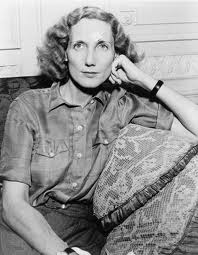She was born Beryl Clutterbuck in on October 26, 1902 in the village of Ashwell in Leicestershire, the youngest child of Charles and Clare Clutterbuck. When she was a toddler, her father moved to Kenya, where he had purchased a farm in Njoro. Once he was settled, he sent for Beryl, her mother and her older brother Richard. Beryl was four years old at the time. Unfortunately her mother couldn’t stand the isolation and promptly returned to England, taking Beryl’s older brother with her. Beryl wouldn’t see her mother again until she was an adult. Beryl never forgave her mother for abandoning her; it colored her relationships with women for the rest of her life. Of course, she hero-worshipped her father; he could do no wrong in her eyes. She would compare every man she fell in love with to her father, most of whom were found wanting in the end.
From childhood, Beryl had an affinity for animals, particularly horses. She could calm even the most recalcitrant horses. In her 84 years on the plant, Beryl’s great loves would be her father, horses and Africa. Although she only had 2 ½ years of actual schooling in Nairobi until she was kicked out for being a bad influence, Beryl was always a great reader throughout her life, thanks to both her father and lovers such as Denys Finch-Hatton and Tom Campbell-Black. Her upbringing meant that Beryl would never be a conventional Englishwoman. It also meant that she grew up practicing the art of survival, that “the end justifies the means.” She could be ruthless and amoral, using people and then discarding them. She often took advantage of friends, running up huge bills on their accounts, without guilt. Outwardly confident, she was also deeply insecure. Blessed with abundant charm, it was hard for her friends to stay mad at her for long.
Beryl was married three times, none of them successful. She married for the first time just before her 17th birthday to Jock Purves, an ex-soldier turned farmer, who was twice her age. The marriage like her other two foundered under the weight of Beryl’s infidelities. Beryl didn’t know the first thing about the responsibilities of being a wife, nor did she grow up with many examples of a good marriage. Her father lived with a married woman, her mother remarried while abroad, and all around her Beryl saw casual infidelities. The members of the Happy Valley Sets swapped partners the way other people swapped recipes. Beryl was also fundamentally selfish and too independent to be confined in marriage. Some biographers claim that Beryl’s third husband, journalist and ghost writer Raoul Schumacher, may have been the actual author of her memoir West with the Night, although Mary S. Lovell in her wonderful biography Straight On Till Morning disputes that claim. If it were true, it would be the only thing that he contributed during their short marriage. Nor did motherhood interest her. She gave birth to her only child, a son Gervase, during her second marriage to Mansfield Markham. After he was born, she dropped off with her mother-in-law who essentially raised him. Occasionally she would visit her son, if she happened to be in England. She saw him for the final time soon after he married in 1955. She never saw him again after that, nor did she ever meet her granddaughters.
A clairvoyant once told Beryl that while she would have great success in life, she would never be truly happy. She never forgot it. Beryl treated sex more like a man, as a necessary function like brushing one’s teeth, or eating. Very few of her lovers touched her heart. She had a scandalous affair with Prince Henry, Duke of Gloucester. The son of George V, Beryl met him when he accompanied his brother, the Prince of Wales on safari. Unfortunately they were not very discreet. When Beryl’s husband at the time, Mansfield Markham found out, he threatened to sue for divorce and name the Prince as a correspondent. In order to keep his name name out of the courts, Prince Henry agreed to put £15,000 into at trust for Beryl, which would pay her an annuity for the rest of her life. The only two men, besides her father, that Beryl ever really loved were Denys Finch-Hatton and Tom Campbell-Black. Both men inspired in her a love of flying and both affairs ended in tragedy. Beryl’s relationship with Finch-Hatton started soon after his affair with Karen Blixen ended, although some of Blixen’s friends believe that Beryl stole him from her. Finch-Hatton introduced her to music and literature, in many ways they were perfect for each other. Neither one had any interest in getting married, or leading a conventional life. Who knows where their relationship might have gone if he hadn’t died in a plane crash.
If anyone could be considered the love of Beryl’s life it would be Tom Campbell-Black. Like Denys Finch-Hatton, he was someone that she had known most of her life. It was he who made sure that she had a thorough education before she took her first solo flight. He made sure that she strip down and repair an airplane engine, how to replace spark plugs, and how to clear jets. She learned how to read maps and to have a thorough knowledge of the instruments. As she did when she was training horses, Beryl kept meticulous records of all her flights. It took 18 months, and a thousand hours in the air; but she soon became the first woman to earn a commercial pilot’s license. From the beginning, flying appealed to her sense of adventure. She ferried people to distant farms, flew mail routes, rescued pilots who had crashed, acted as a spotter for the big game hunters, an an informal air-ambulance service, and could tell from the air where herds of elephants were. This was at a time when air travel was still in its infancy; Beryl often flew with no radio or air-speed indicator, and very few instruments. She was fearless, whether in the air, or riding horses. She even surprised Tom by flying from Nairobi to England solo! While horse racing had been a man’s game, flying was wide open to both men and women. By the time Beryl became interested in flying, several women had already made names for themselves, Amelia Earhart, Amy Johnson, Jackie Cochran and Mary, Duchess of Bedford among them.
In 1936, Beryl Markham became the first woman to fly solo and nonstop from east to west across the Atlantic. No one had made a successful non-stop flight from England to North America, and no woman had crossed the Atlantic from east to west. Amelia Earhart had flown successfully solo across the Atlantic, but she had done it from North America, which was considered the ‘easy way.’ Before the flight, Beryl trained like an athlete, giving up smoking and drinking, and exercising daily to build up her stamina. She pored over maps for hours, plotting what the best route was across the ocean. There were so many factors to consider. She needed a grand total of 6 fuel tanks to make it, if the weather cooperated. For inspiration, Beryl would often visit the factory in Gravesend, England to watch her plane, The Messenger, being built.
She left on Friday, September 4, 1936, after waiting several days for the weather to clear. The crossing was rough from the beginning. Headwinds were driving hard against the plane, reducing her speed to only 90 miles an hour. Four hours in, one of the engines quit, and the first fuel tank was empty. She flew blind for nineteen hours before she crash landed in a peat bog in Nova Scotia, leaving the plane badly damaged. She was lucky to walk away from the nose-in crash with only a small head injury. Despite the fact that she didn’t make it to New York, she was feted and lionized for her daring and skill. Beryl Markham was now a hero. Ironically, one of the reasons that Beryl attempted the flight was to impress Tom Campbell-Black who had surprised her by falling in love and marrying another woman while abroad in England. Beryl hoped that her feat would bring him back to her arms. Unfortunately, Tom Campbell-Black was killed in a freak accident before Beryl could make her case.
After a brief bout with pneumonia, Beryl Markham passed away on August 3, 1986. She was 83 years old.
For further reading:Mary S. Lovell, Straight on Till Morning: The Biography of Beryl Markham. New York: St Martin’s Press, 1987. ISBN 0-312-01096-6
Errol Trzebinski, The Lives of Beryl Markham. New York: W.W. Norton. 1993. ISBN 0-393-03556-5.










No comments:
Post a Comment